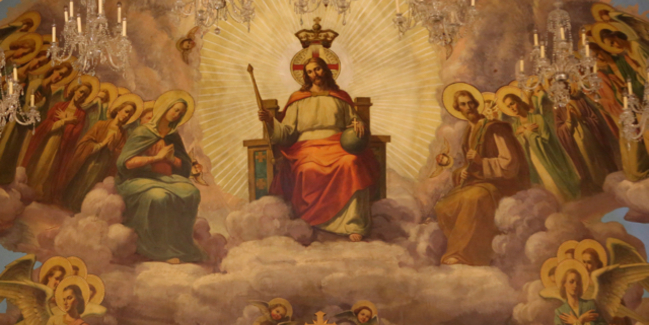Reflection: Solemnity of Christ the King

Jesus is King because he is Son of God, because he is Creator: “through him all things were made’ (Jn1:3). In the Book of Psalms, God is King because he rules over the whole of creation. At the Annunciation the angel Gabriel said to Mary: “The Lord God will give him the throne of David his father, and he will rule over the house of Jacob forever, and of his kingdom there will be no end” (Lk 1:32-33). Jesus is also King by conquest, because by his Passion, Death and Resurrection, he conquered sin, satan and death. Pilate put an inscription over his head on the cross: “Jesus of Nazareth, King of the Jews.” The Good Thief also acknowledged him as King when he said: “Jesus, remember me when you come into your kingdom” (Lk 23:42). Paul also told the Colossians: “He delivered us from the power of darkness and transferred us into the kingdom of his beloved Son” (Col 1:13).
On this Year A of the Sunday Liturgy, we are presented with Christ the King who returns at the End of Time to judge the living and the dead. He separates the righteous from the unrighteous; the righteous he welcomes into his Kingdom while the unrighteous he orders to depart from his presence into eternal fire. The basis of his judgment is: “whatever you did to the least of my brothers you did unto me, and whatever you did not do for any of these little ones, you did not do unto me.” He identifies himself with the least and the little ones of his followers, as he told Paul on the road to Damascus: “Saul, why are you persecuting me?” When you persecute them you persecute me; whatever you do to them, you do to me. This only means that Jesus wants us to see him in our fellowmen, especially the little ones, the needy and marginalized, the last, the least and the lost.
This option for the needy and the poor was already expressed in the Book of Deuteronomy where it was commanded: “When you harvest your wheat and drop some sheaf, do not go back to collect it, leave it for the alien, the orphan and the widow. When you harvest the olives, leave some on the branches for the alien, the orphan and the widow. When you harvest your grapes do not be thorough, leave some for the alien, the orphan and the widow.” Thoughtfulness for the needy and the poor, sharing your goods to those who have none is the fulfilment of the commandment of love: “Love one another as I have loved you.”
The final judgment is not based on knowing Jesus, preaching and writing about Jesus, nor on believing in Jesus as Lord and King, but on doing good to Jesus in our neighbour. “Not everyone who calls to me ‘Lord, Lord’ can enter the kingdom of heaven, but only those who do the will of my Father in heaven.” Deeds and actions will be the basis of the judgment, not faith alone. Believing is not enough, putting that faith into action is necessary. Let us not be Catholic Christians by name, let us be so by the way we live and behave towards everyone around us. “Whatever you did to the least of my brothers and sisters you did to me; whatever you did not do to the least of my brothers and sisters, you did not do unto me.”
